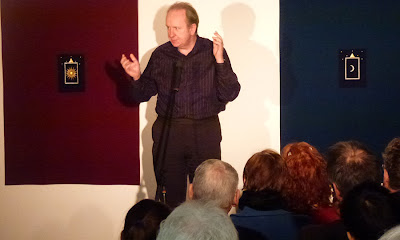I’m doing this thing with the Birmingham Rep and twice now, as I’ve sat there with my iPad out, people have commented on my typing speed, the fact that I can type at all on the glass. And one woman, Liz, even said she admired that I was able to use this stuff when she can’t, when she has to stick with paper notebooks.
I truly have no idea if she was serious. She was very nice, but I’ve seen her using notebooks, I’ve seen many people use them at the BBC, and I envy them. Mostly because they’re legible and I can’t handwrite. Seriously, if I write something down on paper then when I take the pen away at the end, I can’t read what I’ve just written.
There’s also the fact that these notebook-wielding folk are, it seems to me, exceptionally organised. How do you find anything? What happens when you fill that notebook, do you have a shelf full of them somewhere?
It’s become a thing. Recently I worked with someone who brought out a hardbound notebook that filled me with utter glorious nostalgia: though I had entirely forgotten it, the old beeb.com online service – the BBC’s first attempt at commercial websites and the place where Radio Times first began on the internet – had produced a beeb.com-branded A4 notebook for staff. It was very distinctive. I’m sure it was also as cheap as possible, as this was the BBC, but everyone had one in the late 1990s and early 2000s. I had one. Never used it. Couldn’t. But this fella still had one. He says that there were a lot left over when beeb.com closed and he’s just been slowly using the ones up that he’d been given. So in a week or a month or a year or however long it takes him to fill a notebook, they’d be gone and I would never have seen it.
This nostalgic rush came in the same week Liz said that about admiring my use of my iPad. And it happened in the same month that someone at the Birmingham Rep lost their paper notebook.
It was found in a meeting room and by the time I was asked if it were mine, many people had been on the hunt for its owner. I was convinced it was Liz’s. I took it away to bring to her at the next meeting, and I was wrong. Never seen it in her life.
There were these many people involved in searching for the owner but I ended up with this notebook for the best part of a week and it came just as I was really focused on this whole issue of paper notebooks and, I’ll tell you, it got into me. I thought and thought and thought about who could have lost it, about how they use it. I resisted reading any of the notes because that would be like going through someone’s pockets or a woman’s handbag, but eventually I had to in order to find any clues to the owner.
No clues.
Plenty of writing.
I could read all of the writing, at least as I skimmed over it.
But no clues.
Eventually, it looked like I was just going to have to bring this back to the Rep and hope that someone would remember whose it was, to hope that the owner realised where he or she had left it and would come back.
It was a fairly new notebook; the owner hadn’t written very many pages. And it was A4, it was blue, I was conscious of all the Paul Auster stuff about blue notebooks in his novel Oracle Night, I was very conscious of this business of my having the notebook and the owner not, of how I would have to accept that I’d probably never know whose it was and that the owner would probably have to accept that it was lost forever.
I wrote in it.
I put a message in one of the pages toward the back of the book. If he or she ever found the notebook, then someday in the future they would also find that message.
You can’t believe how carefully I wrote. I drew each letter in pencil.
And it was awful.
I turned that pencil on its end and used the eraser.
It was worse.
Seriously? They put rubbers on the end of pencils and they don’t work? Remember, I don’t handwrite anything so this was news to me. I don’t know how you put up with this without marching on the pencil manufacturers of the world.
The note was quite nice, textually, but most of it was unreadable in pencil and the rest, where I’d tried to rub it out and start again, was a mess of graphite that had been shoved about the page instead of erased. It just looked like I’d been out mining for graphite, got it all over my hands and clothes, and happened to lean on a page. Nothing of it looked like writing, nothing of it was presentable to any human being. And rather than being a nice message, I had fouled the notebook.
I looked at the binding of the notebook: no way to unstitch it and remove the one leaf. I searched my office for the razor blades I used to use cutting tape in radio, figuring if I could find it and if I could have a steady enough hand I would be able to slice so finely close to the spine that the owner would never know.
But I couldn’t find those razors. I’d break apart my shaving razor but those blades aren’t as sharp – I have very sensitive skin, you know – and the odds were great that I’d slice apart my fingers in the attempt. I was willing to do it, I was that into this notebook by then, I would do anything to get rid of this abominable mess I’d made in this person’s notebook.
Only, the tiny remaining piece of rationality in my head did twig that my bleeding over the paper might not be the full and complete improvement I would hope for.
Angela had a proper pencil eraser.
Breathe out.
I managed to properly erase the pencil writing I’d made and I even managed to rub out the mess of graphite that I’d smudged all over the page.
Maybe you had to be kind, but if you were, then you’d look at this page and you wouldn’t see a trace of the mess. Or maybe if you looked at the notebook, you wouldn’t very quickly find the messed up page.
But I still had to write in it.
I don’t know why.
I didn’t really still have to write in it but, you know, I still had to write in it.
Did I mention that I can’t write? I do all this iPad stuff, I live in Evernote on my Mac, I swear I got into computing so soon because I needed to get away from handwriting. And I do type very, very quickly. I love typing. It’s one thing I’m good at and typing equals writing to me.I can’t compose on paper, obviously, and I can’t really noodle in my head, I need to knead the keys.
So when I’m writing you a birthday card, I draft out the message on the keyboard. With some people very close to me, I’ll send you the card and then when I figure you must’ve had it, I email you the original text. I’m not proud of this, you understand, I’m not thinking it’s something anyone could admire, it’s just sometimes – often – essential.
Consequently, on the morning of my next Birmingham Rep meeting, I drafted a message. And then I did it.
I did it in pen.
I drew each individual letter. On the page. In this man or woman’s notebook.
Last time I checked, some years ago now, I used to type at about 120 words per minute. It took me an hour to write this short note by hand. I worked this out: I wrote at 1.58 words per minute.
And it wasn’t great. It was better than the pencil, the ink was clearer and narrower than the point of the pencil had been, and I had both my usual careful slowness and the extra added fear of having already cocked it up once.
I think it worked.
Certainly it’s the clearest, most legible thing I’ve ever written by hand. Seriously. Ever. It is in fact the finest penmanship of my life.
I should show it to you now so you can see and maybe reassure me a little. But I wrote in one of the back pages of the blue notebook, I returned it to the Birmingham Rep –
– and an hour later this guy comes looking for it. He’s in the same meeting, I know him, I see him come asking people whether they’d seen his missing blue notebook. I have to feel terribly relieved that the mystery is over.
But there is a part of me that is just a tiny bit disappointed. Yes, he got his notebook back and I know how important that is, I have seen how important that is to people. I’ve had the mystery solved and I really, really, really need my mysteries solved. Only, I’d come to accept that I’d never know. And that’s why I’d written the note. I’d written it so that if the notebook were ever found, if the owner ever filled all the pages before it and came to those back pages, he or she would see a hello there. I would never know if it happened, I would never know whether it happened.
Now I do know the owner but I’m hanging on to one part of all this. I didn’t sign the note, I haven’t told him about it and I’m not going to tell you his name in case he has a Google Alert or something set up for himself.
But I am going to tell you what the note says.
Here’s the draft I typed in Evernote before so very painstakingly destroying his pristine white page with the scrawl of a one-year-old:
Hello.
Forgive my writing in your book but right now, March 1, 2013, it doesn’t look as if I’ll find you, that you’ll ever get this back. I hope you do, whoever you are.
I like that you’re a mystery to me and how if you do get this back and if you do come across this note, I’ll then be a mystery to you. Perhaps we know each other. It’s more probable that we don’t, it’s most likely that we will never meet.
So let this be just a wave hello between fellow mysteries.




